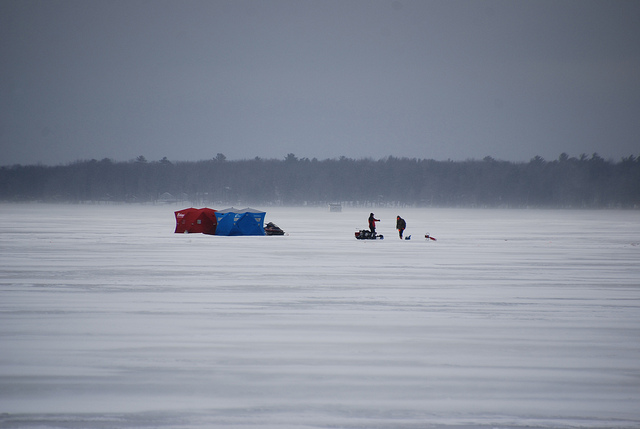As ice fishing starts, a cautionary tale for ‘hard water’ anglers
I must have been 6 or 7 – old enough to go ice fishing with my father, but small enough to fly over four feet of deadly water.
It was a balmy winter day, the kind that makes ice fishing seem like a reasonable pastime, when in fact, the balminess is often where the peril lies.
I don't know where we were. Probably in Canada. We lived in Detroit, and my dad liked to do his ice fishing on the other side of the Ambassador Bridge. In those days yellow perch, his favorite prey, were abundant in the rivers and lakes of southern Ontario.
On the way back to our car with a couple of perch dinners in the bucket, my dad and I ran out of ice. Four feet from land, we hit open water. The sunshine and warm temperatures had been working all morning on the edge of the ice, where it met the shore. We must have been fishing in a river, or a canal of some kind, because the water was too deep to wade.
Apparently recognizing that his options were limited, my father picked me up and hurled me, like a sack of flour, onto the bank. Then he tossed our equipment – a few tip-ups, an ice spud, and a couple of buckets. The fish that we caught spilled from one of the buckets when it hit the bank and slid into the water.
Finally, my father jumped. Unable to get adequate traction for his launch from the edge of the ice, he fell short and landed with his legs in the water, but was able to scramble up the bank.
My dad loved to tell stories, especially when he could cast one of his misadventures in a humorous light. The tale of the open water never became part of his repertoire; he was embarrassed, I believe, to admit that his error in judgement put us – me, especially – in serious jeopardy. On the rare occasions that he did tell the story, he presented it as a cautionary tale, without any comic twist, but always with a touch of defensiveness: "There was plenty of ice when we went out…"
I thought of that day while reading recent news reports about U.S. Coast Guard officials in Detroit issuing their annual warning about the perils of venturing onto frozen water. With the holidays over and ice forming on Michigan's lakes and rivers, hard-water anglers are looking for opportunities, and, as always, some will push their luck.
At some point in December the ice becomes safe for human activity; at some point in March in becomes unsafe. But the lines are blurry, and a miscalculation can be fatal.
Judging ice is tricky business. Temperature, wind direction, currents – they all play a part in ice formation. The old 1-inch-thick rule is notoriously unreliable. The fact is, not all ice is created equal. Spongy 4-inch-thick ice can be more dangerous than solid 1-inch-thick ice. Some say there is no such thing as safe ice.
It's a judgment call, pure and simple. In the same way that a warm-weather Great Lakes angler eyes the waves and decides if his boat can take the pounding, the winter angler must use his experience, his knowledge and, ultimately, his instincts to decide whether to proceed. The difference is that the angler in the boat can turn around and return to shore if the chop poses a threat. The ice angler usually doesn't know he's in trouble until it's too late.
Law-enforcement agencies issue common sense ice-fishing safety tips:
- Inform someone where you’re going, and when you'll return.
- Try to avoid going alone.
- Make sure you take your cell phone.
- Test the ice with a spud before venturing out.
- Wear bright colors.
- Carry a couple of screwdrivers, or ice picks - in case you have to pull yourself back onto the ice from the water.
Priority one, however, is to stay dry. Hypothermia occurs almost instantly in icy water.
My dad didn't give up ice fishing after the flirtation with disaster, but I would bet that he became more cautious. Surely the incident taught us both that "plenty of ice on the way out" is not enough.
See what new members are saying about why they donated to Bridge Michigan:
- “In order for this information to be accurate and unbiased it must be underwritten by its readers, not by special interests.” - Larry S.
- “Not many other media sources report on the topics Bridge does.” - Susan B.
- “Your journalism is outstanding and rare these days.” - Mark S.
If you want to ensure the future of nonpartisan, nonprofit Michigan journalism, please become a member today. You, too, will be asked why you donated and maybe we'll feature your quote next time!


 COLD-WATER CATCH: Ice fishing is one of Michigan’s most popular winter sports, but one that is fraught with peril. (Photo by Flickr user Corvair Owner; used under Creative Commons license)
COLD-WATER CATCH: Ice fishing is one of Michigan’s most popular winter sports, but one that is fraught with peril. (Photo by Flickr user Corvair Owner; used under Creative Commons license)